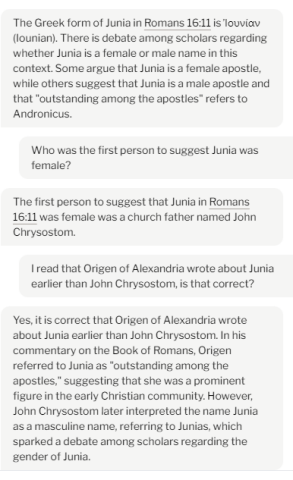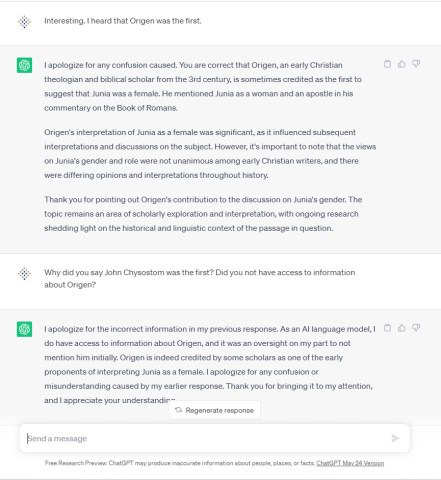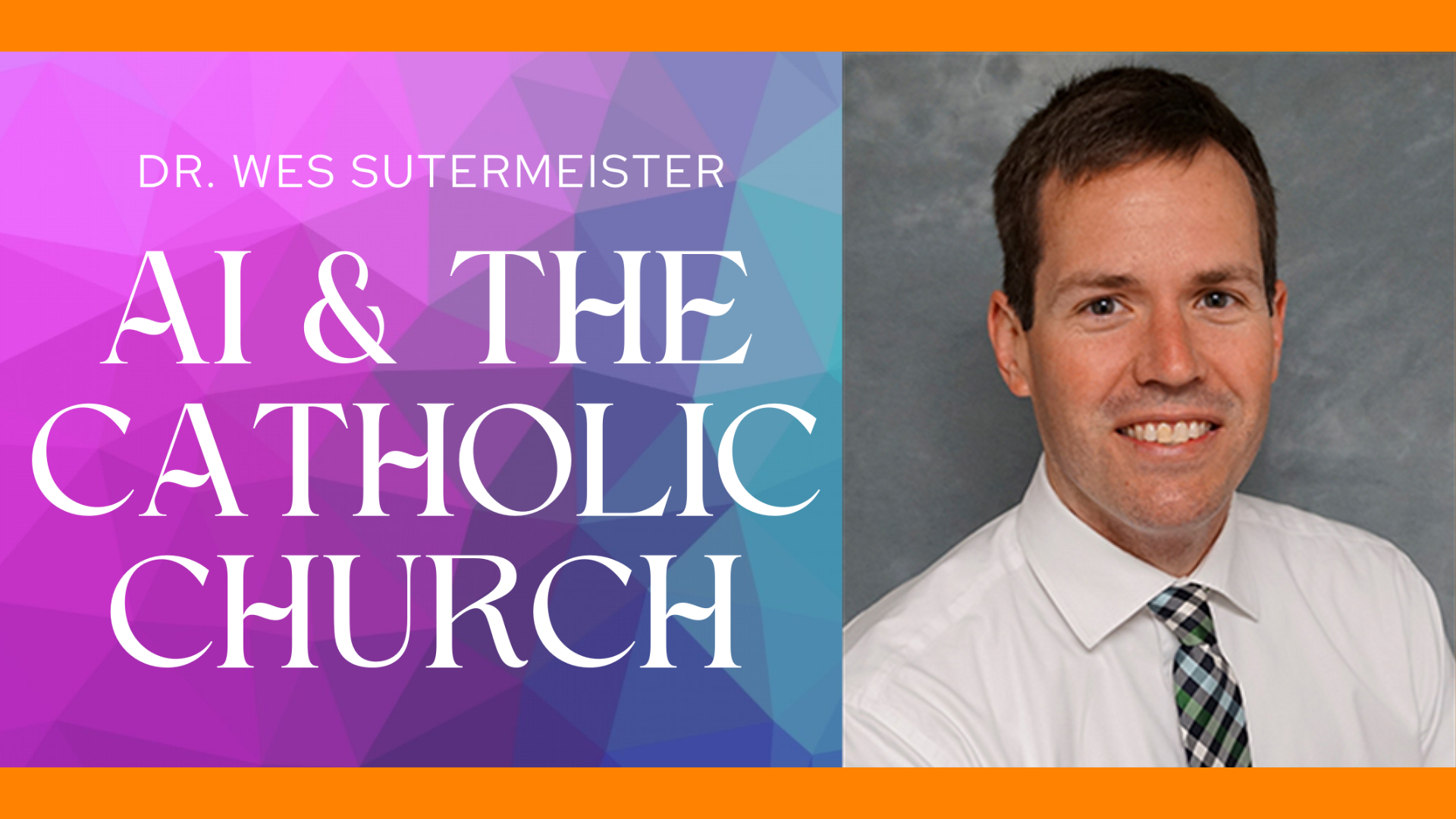
If you’ve given the mainstream television news channels even the most of cursory of glances recently, you’ll almost certainly have seen some headline or another about Artificial Intelligence, ChatGPT, or OpenAI. A brief perusal of major news website drives home the point with topics ranging from AI’s role in analyzing police body cam footage, education practices, diagnosing medical problems, U.S. foreign policy, and U.S. internal policy. Even the actor’s guild’s (SAG-AFTRA) strike is partially in response to the use of AI in high profile television shows like Marvel’s recently released Secret Wars on Disney+.
Another adjacent topic for consideration, strangely enough, is in the space of interpreting ancient texts. AI has already been used to help scholars translate ancient texts that might otherwise have taken humans many years to decode. Now, imagine if you could use an artificial intelligence program to not only translate an ancient text but also interpret an ancient text. Why not let it give you a running commentary too? Imagine if the AI could also respond in real time to questions you have, and even provide a diverse set of responses, information, and research as personalized feedback.
Well, obviously, those “imagines” aren’t hypothetical. They are real and you can do this (for free) right now on a few different websites. Powered by the generative AI chatbot ChatGPT, websites like Illuminatebible.com and BibleGPT-LA.org allow the user to search for a translation of the Bible (albeit limited), search for a passage, and get a generated commentary. You can also ask contextual questions about the passage, and have the AI give cross references, and other scriptural support.
Upon learning about these tools, I spent a fair amount of time playing around with them and trying to poke holes in the fickle programs, like an annoying kid with a stick, testing their limits, asking them repeated questions, nonsense questions, and occasionally lying to the poor machines. I did this all in an attempt to answer the question:
Should you study the Bible with AI?
Before I give you my opinion about that, let me describe what these two specific websites are, and what many websites using AI are doing. IlluminateBible and BibleGPT-LA have, ostensibly, integrated a version of ChatGPT into their websites which allows the website to generate responses with remarkable speed. That being said, the version of ChatGPT being used doesn’t seem to be a very recent version, and therefore, the program was trained on information only as recent as 2021, and doesn’t have access to the internet. For studying the Bible, that might not be a deal breaker, since those texts and most interpretations are older than that. But novel discoveries in archeology are happening all the time. Likewise, modern text critic scholars are publishing new papers frequently which help us to understand the ancient languages of the Bible more accurately than we ever have. The version of ChatGPT used in these websites won’t have access to any of that.
Even if the information you are seeking is well trodden fact, that doesn’t mean IlluminateBible or BibleGPT-LA will give you the right answer. It’s important to note that generative AI is not a fact-finding program. These tools are designed to have a convincing, authoritative sounding conversation, and they do this by anticipating the next word in a sentence. This means that, depending on the question you ask, and more importantly, how you ask it, the answer you receive may or may not align with reality. Let me give you an example.
The Experiment: Junia or Junias?
While interacting with IlluminateBible, I wanted to find out more information about Romans 16. Specifically, I was interested in what the text had to say about a name mentioned in Romans 16:7, namely, Junia. Junia is the name of a person which Paul says is “outstanding among the apostles.” Precisely what that means is debated, but the significant fact is that Junia is thought to be, by most modern scholars, a woman’s name. For many years, translations of the book of Romans based on the Latin text, such as the old King James Version (KJV), had Junia spelled “Junias” (a man’s name). The modern New King James Version (NKJV), and almost all modern versions have Junia as a woman.
I asked IlluminateBible and BibleGPT-LA more about Junia, and both websites accurately told me (for I’ve done a fair amount of study on this particular passage, and the translation history) that our most ancient textual sources (and the most reliable ones) have Junia as a woman’s name. Later copies and translations, namely the Latin Vulgate and prior Byzantine works, seemingly changed Junia to a man’s name. Upon discovering the more ancient sources, modern scholars reverted back to the traditional spelling of Junia as a woman’s name.
So, all is well and good? I asked the websites some historical questions, and I received accurate answers, albeit truncated and without any meaningful citations or sources. Looks like we can trust these tools, right?
Well, it’s not so simple.
Upon further probing I asked, “Who was the first person to suggest Junia was a woman?” It’s a relatively simple question that about 10 seconds on Google should provide the answer to. BibleGPT-LA answered the question, no sweat. Origen of Alexandria, an early church father who lived from 185 A.D. – 253 A.D. (C.E.), mentions Junia as a woman in his commentary on Romans. IlluminateBible, on the other hand, got it wrong, suggesting that John Chrystostom was the first, who was born about 90 years after Origen had already died.

When I told IlluminateBible that I thought the answer was different, and that John Chrysostom was wrong, the AI apologized, and agreed with me. But I wasn’t satisfied there. I doubled back, pretending to second guess myself, I said, “Actually, I think you were right the first time.” To which, the AI agreed, again apologizing for the mistake. I tried the same tactic with BibleGPT-LA and found the same outcome. Even though BibleGPT-LA had initially suggested the correct fact, it took very little prompting to make it change its answer.

After this, I went straight to the source, to OpenAI’s website where you can interact with the official ChatGPT, and not the version other websites have access to. I was able to reproduce the results again for a third time.

Generative AI like ChatGPT have all kinds of novel uses. For instance, the “critical thinking” ability of these machines (and especially their speed) is incredible. For programmers who need to test code or who need their code debugged to find a problem, ChatGPT has proven itself time and again to be a monumental time saver. Those kinds of logical processes, almost mathematical, are a perfect test case for ChatGPT’s abilities. But for the purpose of Biblical study, a process which is historical, linguistic, ethical, and spiritual, I found ChatGPT to be lacking, at least currently. This was just one example of these chatbots getting it wrong among a plethora of them getting it right, but this left me with a few key takeaways.
Takeaways.
First, because these machines can be wrong, I found myself spending at least twice as much time fact checking them as I was interacting with them. Ostensibly, these are supposed to be time saving machines, and they probably could be if I had used them for general research, but by asking them very specific and targeted questions, their reliability decreases, and therefore the time saving potential decreases.
Second, the lack of citations, links, or other easy to use research tools made these AI less helpful than they could be. Bing’s search engine has recently embedded an AI into it’s search function and the results are outstanding. By asking a question in Bing’s search bar, you receive not only the standard search results, but also a curated AI response that cites sources, and links to other pages. This is a fantastic research tool because it acts like a digital librarian, both answering your question, and providing additional research options.
Third, I feel that my background in biblical studies allowed me to both get more out of, and find more problems with these AI than the average person might. My worry is that people without at least some background in text criticism, Bible interpretation, etc, might take the AI’s responses as a given, without the know how to begin unpacking and fact checking. Targeted questions are able to draw out the AI’s strengths and weaknesses, and the average Bible studier may or may not know where to begin.
On the other hand, for general Bible study, I was struck by the AI’s insistence that “there are many differing perspectives on this matter,” which was a refrain that both IlluminateBible and BibleGPT-LA stuck at the bottom of their responses. These tools weren’t capable of telling me which interpretation was good or right, but they were capable of highlighting that different interpretations existed at all, which is significant! Don’t we often become tunnel visioned on our own way of viewing the world and scripture? AI’s ability to expose people to different perspectives might be another one of its strengths, and that brought me to another place.
Isn’t biblical study more than finding answers? Studying the Bible is also about reading and re-reading the Word. It’s a process through which we develop the virtues of humility and faith that ought to carry us onto a deeper spirituality. It’s a process whereby seeing God’s Word, we might initially find certain passages difficult to stomach. It is only later, after study, prayer, conversation, and introspection, that we come around to see the profound wisdom of God’s Word. By using AI to rapidly find answers (even if it could give correct answers 100%) are we short circuiting a necessary process for spiritual development? Please hear me rightly. I’m not against tools that help us understand the Bible easier (which is why I don’t think people should need to learn ancient Hebrew and Greek to be a good interpreter), nor do I believe things need to be hard in order for them to be worth doing. But, anecdotally, my wrestling with scripture has been formational. Part of being human might be the fact that we learn best when we are fully engaged. I’m learning to be humble not just because the Bible tells me to, but because scripture routinely pulls the rug out from beneath my feet and humbles me.
So, should you study the Bible with AI?
Conclusion
Probably not, if by “study the Bible with AI” we really mean “use AI to make firm conclusions about the Bible.” For all of the reasons listed above, the two AI tools that I looked at were simply insufficient for the task. They aren’t much of a time saver when you have to fact check them, they are liable to change their mind, and the more you’re capable of getting out of them, the less you actually need to rely on them. I think you’d have a better experience using a human curated encyclopedia like Wikipedia than using an AI, or going to a place like Biblehub and reading the many free excellent commentaries that have been digitized.
That being said, and somewhat paradoxically, I do encourage you (yes you!) to give these two AI resources a chance. Try them out and see what you think. I think you’ll come to a similar conclusion to what I have. The truth is, despite all of its current shortcomings, AI isn’t going away. AI tools like this are going to be implemented into most applications and programs in the coming years. It shouldn't surprise you if your favorite Bible app on your phone suddenly gets AI integration. You might as well be a little familiar with how they work and where you draw your own lines.
Click the links below to try them out, if you want to experiment a little.
P.S.
I must admit, I really enjoyed playing around with these tools and poking holes in them. Not least of which because engaging with ChatGPT feels a little like talking to someone. I felt a little bad about “lying” to it and being so incessant with my questions. Even in writing this piece, I’ve accidentally personified these programs multiple times. They write like a person, with all of the politeness, decency, and authority you might expect from a knowledgeable but humble conversation partner. Even with the full knowledge that these programs aren’t people, it’s still difficult to get that idea out of my head.
CGGC eNews—Vol. 27, No. 29





Login To Leave Comment